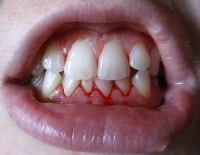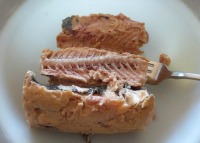Pregnancy Gingivitis -
Causes of Bleeding Gums during
Pregnancy
Pregnancy gingivitis is experienced by 65 to 70% of pregnant women, but then gingivitis is a common
condition among the population in general.
Gingivitis, also called periodontal disease, it's caused by a bacterial film that grows on the teeth, resulting in plaque buildup. This plaque irritates the gums, making them tender, bright red, swollen, sensitive, and easy to bleed.

If you floss, brush and get regular dental care, it's possible to keep the problem under control, but if you don't, it can lead to more serious problems.
The advanced stage of gum disease is called periodontisis,
in which the bone supporting the teeth begins to erode as a result of
the infection, and in the long run it can lead to tooth loss.
The
bacteria causing the problem are present in the mouth all the time and
are kept in check with flossing and brushing, but when you avoid regular
dental care, the sugars and starches in your food mix with the bacteria
and form the plaque on your teeth.
After a couple of days, the plaque hardens into tartar, the bacteria set up permanent residence and the gums start getting irritated.
Causes of Pregnancy Gingivitis
During pregnancy gingivitis is more common. Increasing levels of estrogen and progesterone cause the
gums to swell and become somewhat softer than normal and circulation of blood to them increases, making them
more prone to bleeding and infection.
The hormonal changes during pregnancy change the body’s
natural response to dental plaque exaggerating the way the gum tissues react to the bacteria in
plaque, thus resulting in a higher chance of pregnant women getting gingivitis.
The risk of
getting gingivitis increases beginning with the second month of pregnancy and decreases with the ninth
month.
Since the bacteria that cause gingivitis can enter the bloodstream, the bacteria can
travel all the way down to the uterus.
This triggers the body to produce
prostaglandins, which are natural fatty acids that normally control inflammation and smooth
muscle contraction.
When a woman is pregnant, her level of prostaglandins increases and peaks when she goes into labor. One
theory is, if extra prostaglandins are produced when the body is reacting to infected gums, a pregnant
women’s body may think it's a signal to go into labor sooner than expected, thus causing a baby to be born
too early or too small.
Poor nutrition is another possible cause of gingivitis, which
means that on top of causing health problems for yourself and your baby, you can create more plaque that
irritates your gums.
10 things you can you do
to prevent pregnancy gingivitis
- Eat a varied diet of fresh fruits, green leafy vegetables, meat and whole grains to provide your teeth and gums with needed exercise and supply the body with the vitamins and minerals that are essential for dental health.
- Although all vitamins and minerals are essential for the proper formation and continued health of the teeth, adequate vitamin C intake is particularly important for the prevention of pregnancy gingivitis.
- Beta-carotene, precursor of vitamin A, can help support collagen synthesis and wound healing as
well as boosting the body's ability to fight infections.
- Eat plenty of high-fiber foods, such as whole grains, vegetables and legumes.
- Avoid sugar and all refined carbohydrates. Sugar causes plaque build-up and inhibits the ability of white blood cells to fight off bacteria.
- Be sure your diet contains enough calcium and high-quality, complete proteins such as soy products.
- If you smoke, quit - preferably before you get pregnant. Cigarette smoking reduces the oxygen supply to the developing fetus and also drains vitamin C from the body. Smoking has no place in your diet if you want to follow the best nutrition during pregnancy.
- If your gums are very sore, you may want to apply some aloe vera gel directly to the inflamed gums, as it eases discomfort and soothes the tissues.
- You could also open a capsule of vitamin E and rub the oil on inflamed gums, it helps gums to health and alleviates soreness.
- Folic acid is a supplement that pregnant women are often encouraged to take to prevent birth
defects in the baby. It can also reduce gingival inflammation, especially if taken as a folate
mouthwash.
Healing Foods for Pregnancy Gingivitis

Citrus fruits and other fruits high in vitamin C
Oranges - 84 mg in a cup
Kiwi - 70
mg
Grapefruits - 45 mg in one half
Cantaloupe - 25 mg in one-eighth
Black currants - 180 mg
in 100 grams
Guava - 125 mg in one fruit
Cranberries - Cranberry juice is widely
known to prevent urinary tract infections, but a study in the Journal of the American Dental Association
found that cranberry juice can also reverse and inhibit the growth of dental plaque bacteria - and taking
out the bacteria should lessen the risk of pregnancy gingivitis. But try to get cranberry juice without
sugar, otherwise it defeats the object.
Red and green peppers, Brussels sprouts and
broccoli - These vegetables also contain a decent amount of vitamin C. One medium red pepper contains
152 mg, while a green pepper has 95 mg. One cup of broccoli features 81 mg, while a cup of Brussels sprouts
has 75 mg.

Sardines and salmon - A study in Journal of Periodontology showed that those with a lower calcium intake had a higher risk of gingivitis: a 54% higher risk for women who took only 2 to 499 mg of calcium and a 27% risk for women who had a moderate calcium intake levels of 500 to 700 mg.
When you think of calcium, don't always assume you have to increase your intake of dairy foods, but canned sardines and salmon have good amounts of calcium - 325 mg in 3oz/100 g. of Atlantic sardines in oil and 181 mg in the same amount of canned pink salmon.
Please note that fresh salmon has much less calcium,
roughly 10 mg for the same amount serving. Why? When salmon is canned,
the calcium-rich bones are canned as well, and these bone soften during
the canning process, which makes them digestible.
Soy and tofu
- Many calcium-enriched soy beverages are available and they typically
include about 300 mg of calcium per cup. Even more amazing, raw firm
tofu prepared with calcium sulfate contains 861 mg of calcium in just a
half cup. Hard tofu prepared with nigari contains 345 mg of calcium in
100-gram serving.
Yogurt, milk and cheese - An 8oz/100 g.
container of non-fat plain yogurt contains almost half the recommended
daily amount of calcium, a total of 452 mg. A 1.5oz/45 g. of Romano
cheese contains the same amount of calcium and 2oz/60 g. of pasteurized
processed Swiss cheese has 438 mg.
Pregnancy gingivitis is just one of the problems that might arise during pregnancy. Have a look at others
in the pages below:
Nutrition During Pregnancy - What to Eat for a Healthy Pregnancy
Anemia in Pregnancy - Healing Foods for the Anemia Diet
Natural Cures for Bladder Infections during Pregnancy
Constipation during Pregnancy - Which Foods to Eat
Heartburn during Pregnancy - Healing Foods to Relieve Heartburn
How to Relieve Morning Sickness in Pregnancy
A website on pregnancy that I find extremely useful is Pregnancy Friend by Jo Walker. It's packed full of advice and information, do have a look at it!
Search for information on this site:
Receive Discover the Power of Healing Foods! Free
Newsletter
RELATED PAGES:
Nutrition during Pregnancy - What to Eat for a Healthy Pregnancy
What to Eat When Problems Arise:
Anemia in Pregnancy - Healing Foods for the Anemia Diet
Natural Cures for Bladder Infections in Pregnancy - Foods to Avoid and Foods to Eat
Pregnancy Gingivitis - Causes of Bleeding Gums during Pregnancy
Constipation during Pregnancy - Which Foods to Eat
Heartburn during Pregnancy - Healing Foods to Relieve Heartburn
How to Relieve Morning Sickness in Pregnancy
New! Comments
Have your say about what you just read! Leave me a comment in the box below.